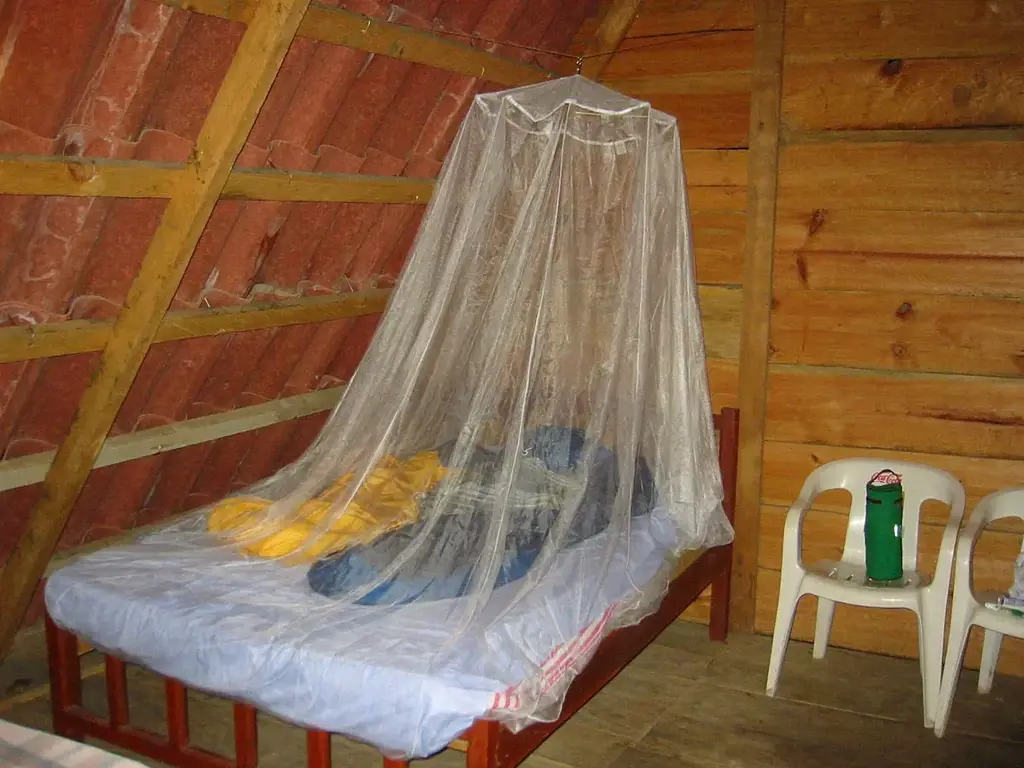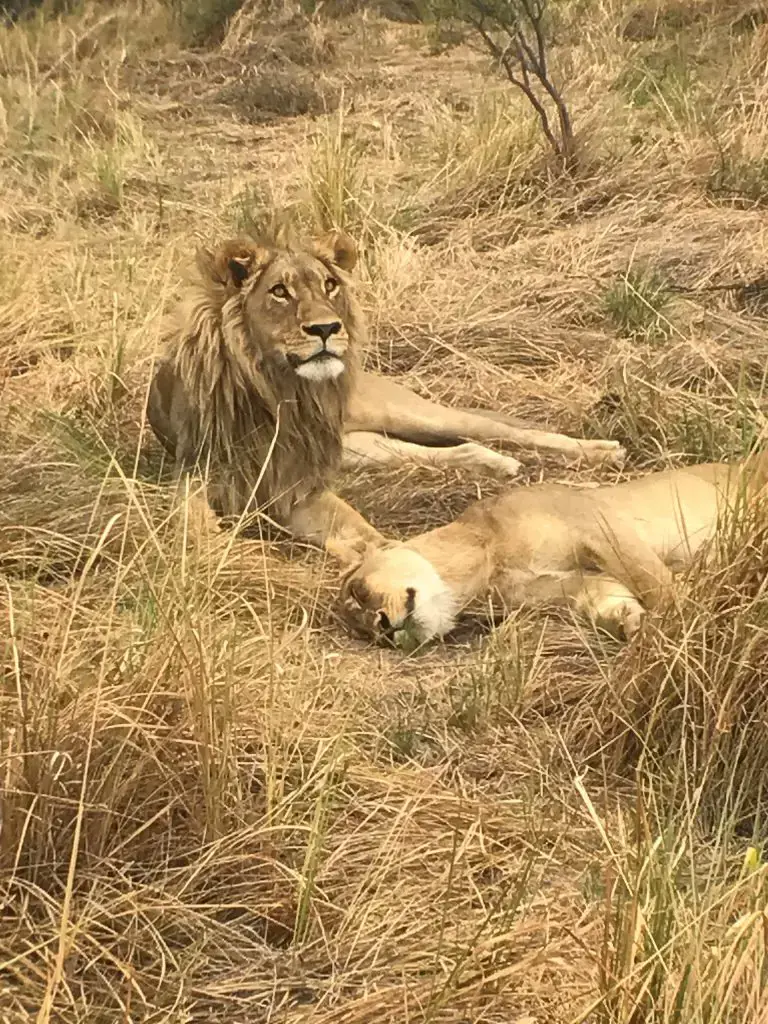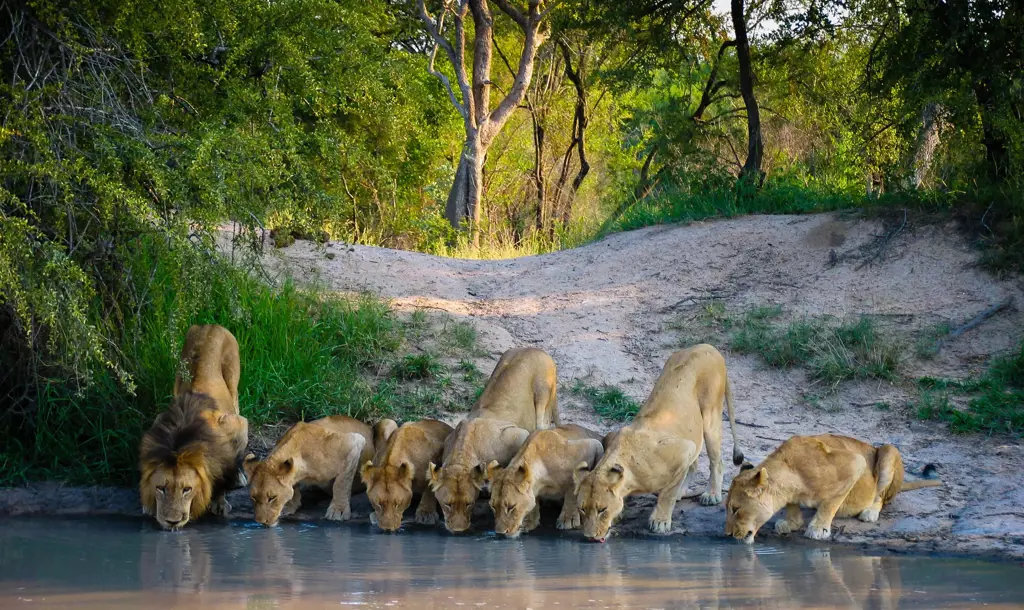
Are you planning a thrilling African lion safari? Get ready to embark on an adventure of a lifetime! But before you hop on that jeep and head into the wilderness, make sure you're well-prepared. In this article, we'll explore the essential items you need to bring on an African lion safari to ensure your safety, comfort, and an unforgettable experience. From protective gear to capturing those breathtaking moments, we've got you covered. So, gear up and let's dive into the wild world of lion safari preparation!
What You'll Learn
- What type of clothing should I pack for an African lion safari?
- Are there any specific items or gear that is recommended to bring on an African lion safari?
- Is it necessary to bring insect repellent or mosquito nets for an African lion safari?
- Should I bring binoculars or a camera for an African lion safari?
- Are there any specific medications or vaccinations that I should pack for an African lion safari?

What type of clothing should I pack for an African lion safari?

When going on an African lion safari, it is important to pack appropriate clothing that will not only offer protection but also enhance your overall comfort during the trip. African safaris can be hot and dusty, so it is essential to choose clothing that will keep you cool, protect you from the sun, and be suitable for outdoor activities such as game drives and bushwalks.
Here are some recommendations for the type of clothing to pack for an African lion safari:
- Light and breathable clothing: Opt for lightweight and breathable fabrics such as cotton or linen. These materials help to wick away moisture and keep you cool in the hot African climate. Avoid synthetic fabrics as they tend to trap heat and moisture, making you feel uncomfortable.
- Long-sleeved shirts and trousers: Wearing long-sleeved shirts and trousers offers protection from the sun, insects, and thorny vegetation. Choose loose-fitting, lightweight clothing that allows air circulation and provides adequate coverage. Additionally, long-sleeved clothing can also protect you from mosquito bites and reduce the risk of contracting diseases such as malaria.
- Neutral-colored clothing: Neutral colors such as khaki, beige, and olive are ideal for safaris as they blend well with the natural environment. Avoid bright colors like red, orange, or white, as they may attract unnecessary attention or scare away wildlife. It is best to opt for earthy tones that mimic the colors of the African savannah.
- Hat and sunglasses: Protect your head, face, and eyes from intense sun exposure by wearing a wide-brimmed hat and sunglasses with high UV protection. A hat will also shield you from dust and provide some shade, especially during game drives when the sun is at its peak.
- Sturdy closed-toe shoes: It is important to wear comfortable and sturdy closed-toe shoes when going on a safari. Opt for lightweight hiking boots or closed-toe sandals for maximum comfort and protection. They will offer support, prevent your feet from getting dirty or injured, and reduce the risk of insect bites.
- Layered clothing: Although the days can be hot in Africa, the nights and early mornings can be chilly. Therefore, it is advisable to pack a few layers such as lightweight sweaters or jackets that you can easily remove or add as per the temperature changes. Layering allows you to adjust to the changing weather conditions throughout the day.
- Swimwear: Many safari lodges and camps offer swimming pools, so it's a good idea to pack swimwear if you wish to take a refreshing dip during your downtime. Additionally, swimwear can also come in handy if you plan to visit any nearby water bodies or beaches during your trip.
- Insect repellent and sunscreen: Don't forget to pack insect repellent and sunscreen with a high SPF rating. Apply sunscreen generously to protect your skin from harmful UV rays, and use insect repellent to ward off mosquitoes and other biting insects. It is important to reapply both products frequently, especially after swimming or excessive sweating.
Remember, packing light and versatile clothing is key for an African lion safari. Choose items that can be easily mixed and matched, and prioritize comfort and functionality over fashion. By following these clothing recommendations, you can ensure a comfortable and enjoyable safari experience while keeping yourself safe and protected.
What to Pack for a Whale Trail Adventure
You may want to see also

Are there any specific items or gear that is recommended to bring on an African lion safari?

Going on an African lion safari is an exciting and unique experience. It allows you to witness these majestic creatures in their natural habitat and get up close and personal with them. However, it is important to be well-prepared for such an adventure. In this article, we will discuss the specific items and gear that are recommended to bring on an African lion safari.
Comfortable Clothing:
When going on a safari, it is important to wear comfortable and lightweight clothing. Opt for natural fabrics such as cotton, linen, or breathable synthetic materials. Avoid bright colors and stick to earth tones like khaki, brown, or green to blend in with the surroundings. Long-sleeved shirts and pants are recommended to protect your skin from the sun and insect bites.
Sturdy and Comfortable Footwear:
African safaris involve a fair amount of walking and hiking, so it is crucial to wear sturdy and comfortable footwear. Choose closed-toe shoes with good grip so that you can navigate through uneven terrain easily. It is also advisable to bring a pair of sandals or flip-flops for relaxation at the campsite.
Binoculars and Camera:
Binoculars are essential for wildlife spotting on safari. Invest in a good pair with a high magnification power to observe the lions and other animals from a safe distance. Additionally, don't forget to pack your camera with extra batteries and memory cards to capture those incredible moments.
Sun Protection:
The African sun can be intense, so it is vital to pack sun protection items. These include a wide-brimmed hat to shield your face and neck from the sun, sunglasses to protect your eyes, and a high SPF sunscreen to apply all over your exposed skin. A lightweight scarf or shawl can also come in handy for extra protection or to shield yourself from dust and wind.
Insect Repellent:
Africa is home to various insects, including mosquitoes, so it is crucial to protect yourself from insect bites. Carry a good quality insect repellent containing DEET and apply it regularly. You may also consider packing mosquito nets or wearing long-sleeved shirts and pants in the evenings.
First-Aid Kit:
Having a basic first-aid kit is advisable for any outdoor adventure, including an African lion safari. It should include band-aids, antiseptic cream, pain relievers, motion sickness medication, anti-diarrheal medicine, and any prescription medications you may need. Additionally, it is essential to consult with your healthcare provider before traveling to inquire about any required vaccinations or medications.
Reusable Water Bottle:
Staying hydrated is important during a safari, so remember to pack a reusable water bottle. Fill it up regularly from safe drinking water sources and avoid single-use plastic bottles to reduce waste and protect the environment.
Snacks and Beverages:
Safaris can be long and tiring, so it is advisable to pack some snacks and beverages to keep yourself energized. Bring light and non-perishable items such as granola bars, nuts, dried fruits, or energy drinks. It is important to note that any food waste should be properly disposed of to avoid attracting wildlife.
In conclusion, going on an African lion safari requires careful planning and packing. By bringing the recommended items and gear mentioned above, you can ensure a comfortable and memorable experience. Remember to respect the wildlife and their environment by following all guidelines provided by the safari operators and local authorities. Enjoy your African lion safari adventure!
Essential Items to Pack for a Well-equipped Vacation Rental Kitchen
You may want to see also

Is it necessary to bring insect repellent or mosquito nets for an African lion safari?

When planning an African lion safari, it is important to consider the necessary precautions to protect oneself from insect bites. While lions may be the main attraction, it is the small but mighty mosquitoes that can pose a bigger threat in terms of diseases like malaria and dengue fever. Therefore, it is highly recommended to bring insect repellent and consider using mosquito nets during your safari.
First and foremost, mosquitoes are prevalent in many parts of Africa, particularly in areas with stagnant water and dense vegetation, which are common habitats for these blood-sucking insects. Many of the top African safari destinations are located in these types of environments, making insect repellent a crucial item to pack for your trip.
Insect repellent containing DEET (N,N-diethyl-meta-toluamide) is the most effective at keeping mosquitoes at bay. It is able to disrupt the sensory receptors on mosquitoes, making it difficult for them to locate and bite you. A repellent with at least 30% DEET is recommended for optimum protection against mosquito bites.
In addition to insect repellent, mosquito nets can provide an extra layer of defense against these pests. When sleeping in open-air lodges or campsites, mosquito nets can create a physical barrier between you and the mosquitoes, significantly reducing the risk of bites while you rest. It is important to ensure that the mosquito nets are in good condition and properly fitted to provide maximum protection.
Furthermore, it is worth noting that not all areas in Africa have the same risk of mosquito-borne diseases. It is advisable to consult a travel clinic or healthcare professional prior to your safari to determine the specific precautions needed based on your destination. They will be able to provide information on the prevalence of diseases in the area and advise on the appropriate vaccinations or medications that may be required.
Although lions may be the highlight of an African safari, it is crucial to acknowledge the potential risks posed by mosquitoes and take the necessary precautions. Bringing insect repellent and considering the use of mosquito nets can greatly reduce the chances of mosquito bites and subsequent infections. By protecting yourself from these tiny but formidable creatures, you can fully enjoy the majestic beauty of African wildlife without any unnecessary health concerns.
The Ultimate Guide to Packing Efficiently for Your Four-Hour Blogging Trip
You may want to see also

Should I bring binoculars or a camera for an African lion safari?

When planning for an African lion safari, you may wonder whether to bring binoculars or a camera to enhance your experience. Both devices have their merits, and the decision ultimately depends on your personal preferences and goals for the safari.
Binoculars can be a valuable tool for observing and studying the behavior of African lions from a distance. With binoculars, you can witness their natural habitat and intricate social dynamics without disturbing them. Binoculars allow you to zoom in and focus on specific details, such as their interactions with other animals or their hunting techniques. This can be particularly useful if you have a keen interest in wildlife photography or if you want to study these majestic creatures more closely. Moreover, binoculars can also be handy for spotting other animals in the distance, such as giraffes, elephants, or rhinos.
On the other hand, a camera enables you to capture the beauty and essence of African lions in stunning photographs. While binoculars provide a more personal and immersive experience, a camera allows you to preserve and share your memories with others. From close-ups of their magnificent mane to action shots of them in pursuit of prey, a camera can document the entire safari and serve as a visual reminder of this extraordinary journey. Additionally, a camera can be versatile in capturing not just the lions but also the breathtaking landscapes, vivid sunsets, or vibrant flora and fauna that you may encounter during your trip.
If you have a strong interest in photography or enjoy capturing moments to share with others, investing in a good camera with a telephoto lens is recommended. This will allow you to capture detailed images of the animals from a safe distance while preserving their natural behaviors.
Ultimately, whether you choose to bring binoculars or a camera depends on your personal preferences and goals for the safari. Consider the type of experience you want to have and whether you prioritize observation or photography. Some travelers may opt to bring both, as they offer different benefits and can complement each other. Binoculars for observing and studying the animals, and a camera to capture and share the moments you encounter.
Whatever your choice, it is important to remember that the primary goal of an African lion safari is to appreciate and respect these magnificent creatures in their natural habitat. Whether you are observing them through binoculars or capturing them on camera, ensure that you are always considerate of their space and welfare. Enjoy the safari and take the opportunity to connect with nature in a profound and meaningful way.
The Essential Packing List for a Two-Week Trip to Mexico in March
You may want to see also

Are there any specific medications or vaccinations that I should pack for an African lion safari?

When going on an African lion safari, it is important to be well-prepared and take necessary precautions to ensure your safety and health. While there are no specific medications or vaccinations that are required for a lion safari, there are a few things you should consider packing.
First, it is always a good idea to consult with a travel health professional or your doctor before embarking on your safari. They will be able to provide you with the most up-to-date information on any required or recommended vaccinations for the specific region you will be visiting in Africa.
In terms of general vaccinations, it is important to make sure that you are up to date on routine vaccinations such as measles, mumps, rubella, diphtheria, tetanus, and pertussis. Additionally, it is recommended to receive vaccinations for hepatitis A and typhoid, as these diseases can be contracted through contaminated food or water.
Malaria is also a concern in many parts of Africa, including regions where lion safaris are popular. It is crucial to discuss malaria prevention options with your doctor. They may recommend antimalarial medication, as well as insect repellents and bed nets, to protect against mosquito bites.
In addition to vaccinations and medications, there are other essentials you should pack for a lion safari. Sunscreen with a high SPF, a hat, and sunglasses are crucial to protect yourself from the sun's harmful rays. Insect repellent is also a must to prevent mosquito bites and other insect-related annoyances.
It is also important to pack a first aid kit with basic supplies such as bandages, antiseptic ointment, and over-the-counter pain relievers. While safari guides and camps often have first aid supplies available, it is always a good idea to have your own as well.
Lastly, it is important to follow any safety guidelines provided by your safari guide or camp. While African lions are generally not a significant threat to humans when encountered in the wild, it is still important to exercise caution and follow any instructions given by your guide.
In conclusion, there are no specific medications or vaccinations that are required for an African lion safari. However, it is important to consult with a travel health professional or your doctor to ensure that you are up to date on routine vaccinations and to discuss any additional vaccinations or medications that may be recommended based on the specific region you will be visiting. Additionally, it is important to pack essential items such as sunscreen, insect repellent, and a first aid kit to ensure your safety and well-being during your safari.
Essential Items to Include in Your Tsunami Emergency Kit
You may want to see also
Frequently asked questions
When packing for African Lion Safari, it is important to dress for comfort and practicality. It is recommended to pack lightweight, breathable clothing such as cotton t-shirts, shorts, and pants. Additionally, it is advisable to bring a hat, sunglasses, and comfortable walking shoes for exploring the safari park.
Yes, it is wise to pack insect repellent to protect against mosquitos and other insects. Additionally, consider bringing long-sleeved shirts and pants as an added layer of protection. It is also recommended to pack a small first aid kit with basic essentials such as band-aids and antiseptic cream.
To capture the wildlife at African Lion Safari, it is ideal to bring a camera with a zoom lens. This will allow you to get closer shots of the animals without disturbing them. It is also useful to pack extra memory cards and batteries to ensure you don't run out of storage or power during your safari experience.
The weather in African Lion Safari can vary depending on the season. In general, it is advisable to pack sunscreen, a reusable water bottle, and a light jacket or sweater for cooler mornings or evenings. It is also important to check the weather forecast before your trip to ensure you pack appropriately for the specific conditions.







